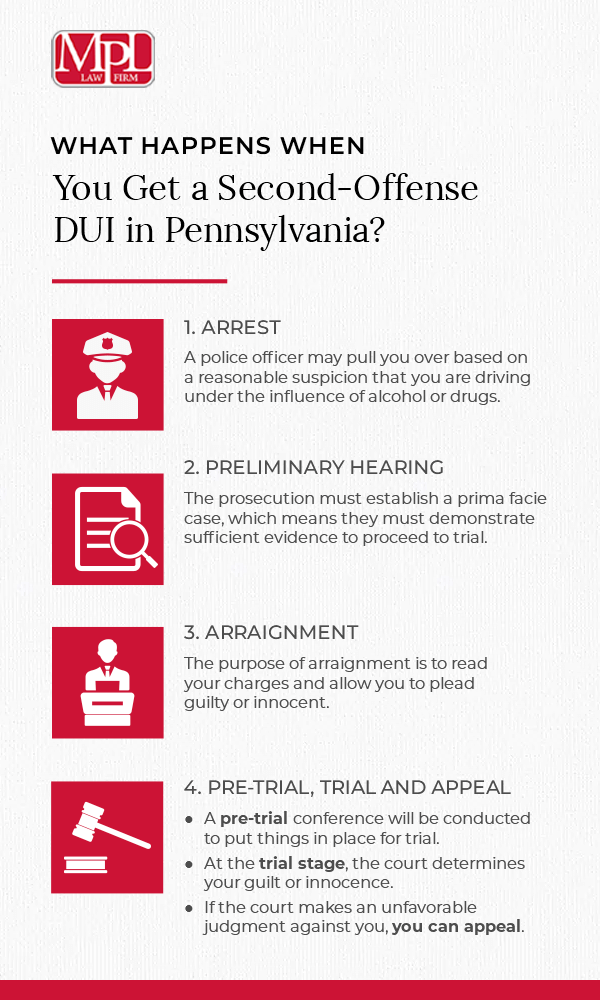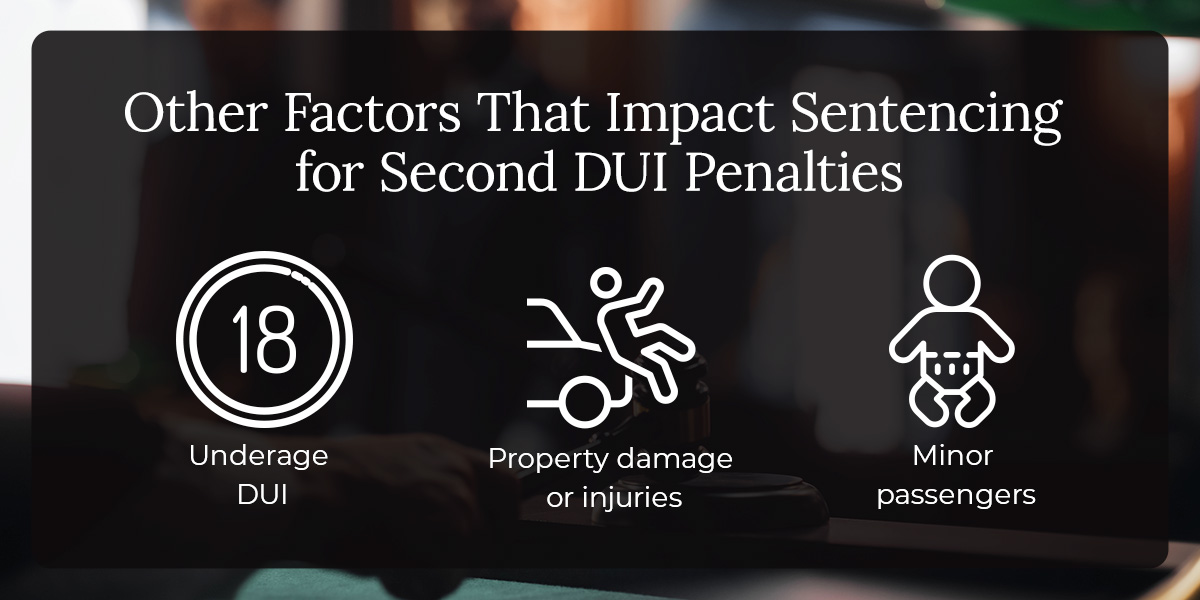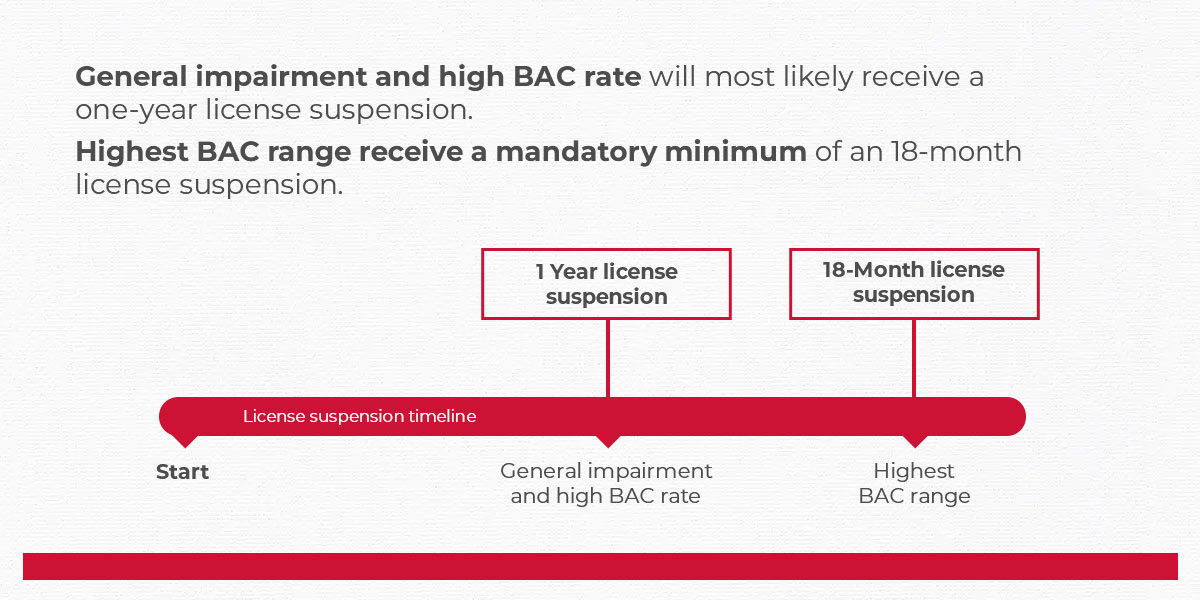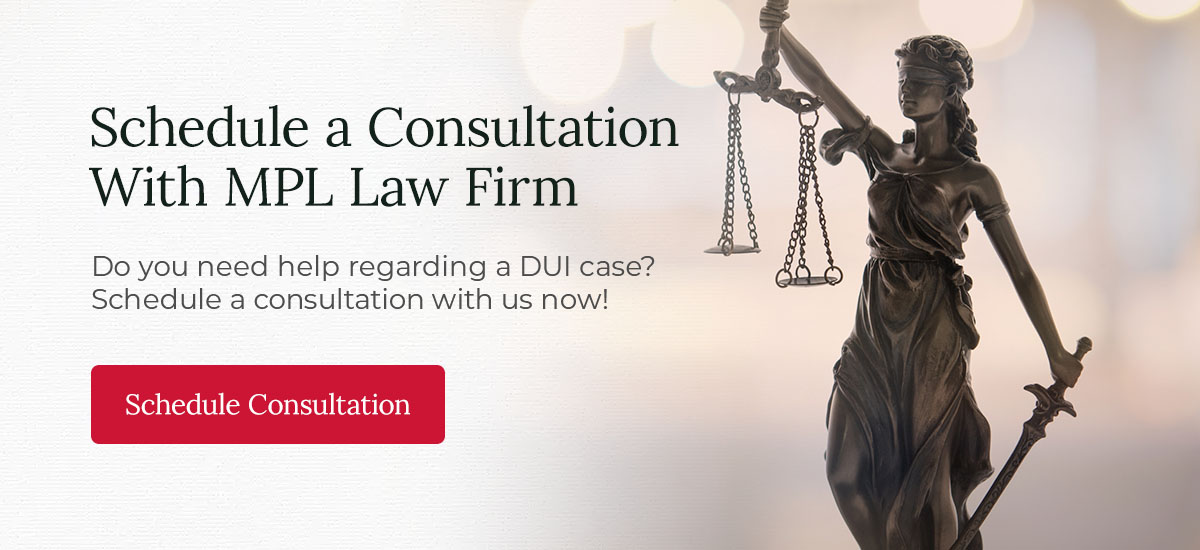
Second DUI Offenses in Pennsylvania
Pennsylvania’s justice system is strict on second-time offenses involving driving under the influence (DUI) of alcohol or drugs. The elements of a Pennsylvania DUI charge are driving a vehicle while under the influence of alcohol or other drugs or in violation of the state’s “per se” laws, which is an allegation that you had a blood alcohol content (BAC) of 0.08% or greater.
The punishments are severe, with a high possibility of prison sentences and fines, among other things. An experienced criminal defense attorney can evaluate your case and help you develop a strategy to relieve you of criminal liability or mitigate the sentence, depending on the circumstances. This guide explains second DUI offenses in detail, covering the legal processes, factors that impact punishment, license suspensions and more.
Understanding Second DUI Offenses in Pennsylvania
If you have been charged with a second DUI offense, it’s essential to understand that the stakes are higher than they are with a single offense. In addition to facing mandatory jail time and license suspension, getting charges reduced comes with added challenges. Unlike first-time offenses, where the justice system is more lenient, the judges are stricter regarding repeat offenses. Plus, there are limited alternate forms of punishment for second DUI cases.
Pennsylvania has strict DUI laws, which you must carefully navigate to avoid or reduce the adverse legal implications. Some repeat cases can amount to felonies, meaning harsher sentences. Therefore, it’s crucial to contact an experienced criminal defense attorney immediately after you are charged with a DUI offense.
Lawyers have the experience to evaluate your case and develop practical strategies. Depending on the circumstances, they can build a solid defense to increase your chances of avoiding criminal liability. Some attorneys also provide supportive services necessary in such challenging situations.
What Happens When You Get a Second-Offense DUI in Pennsylvania?
The legal process involving second DUI cases is similar to first-time DUI offenses:
1. Arrest
A police officer may pull you over based on a reasonable suspicion that you are driving under the influence of alcohol or drugs. The officer will typically require you to undergo chemical testing in such instances.
In Pennsylvania, there is an implied consent rule which presumes that you implicitly agree to submit to breath, urine or blood testing when the officer suspects DUI. Refusing to submit can result in adverse legal consequences, which we’ll discuss later.
2. Preliminary Hearing
The prosecution must establish a prima facie case, which means they must demonstrate sufficient evidence to proceed to trial. The prosecution may successfully do this by producing evidence for each material element of a DUI charge and establishing that there is probable cause to believe that you committed the offense.
3. Arraignment
If the judge or magistrate determines that there is sufficient evidence to justify a trial, they will schedule a formal hearing in the Court of Common Pleas. The purpose of arraignment is to read your charges and allow you to plead guilty or innocent. If you plead guilty, the court will schedule a date for sentencing. Alternatively, pleading not guilty will result in your case proceeding to trial.
4. Pre-Trial, Trial and Appeal
A pre-trial conference will be conducted to put things in place for trial. Among other things, you can request discovery, which enables you to obtain information in the prosecutor’s or investigator’s possession, such as laboratory reports. You may also make pre-trial motions, depending on the circumstances. Pre-trial motions allow you to seek favorable orders.
At the trial stage, the court determines your guilt or innocence concerning the evidence on record. The prosecutor must prove beyond reasonable doubt that you committed the offense, which means they must satisfy all the elements of the criminal charge with incontrovertible evidence. After evaluating the arguments and evidence, the judge will pass judgment. If the court makes an unfavorable judgment against you, you can appeal the conviction, sentencing or both.
How DUI Impairment Rates Affect a Second DUI Offense in Pennsylvania
DUI impairment rate is the level of alcohol in your body at the time of the incident. It’s determined by your blood alcohol content (BAC) and plays a crucial role in determining your sentence. In Pennsylvania, the BAC is categorized into three tiers. These are:
- General impairment: 0.08% – 0.099% BAC
- High BAC: 0.10% – 0.159% BAC
- Highest BAC: 0.16% BAC and above
Individuals who refuse chemical testing face the same punishment as the highest tier for DUI in Pennsylvania. Drug DUIs are charged with the highest BAC rate, regardless of the level of substance found in your body.
Drivers below the legal drinking age of 21 are charged with high BAC and may face more severe penalties even if they fall within the general impairment range or lower. However, if underage drivers test for the highest BAC, they will be charged accordingly.
Pennsylvania DUI law provides mandatory minimum sentences based on the impairment level and number of DUI offenses committed. Below is a summary for second-time offenders:
1. General Impairment
The mandatory minimum sentencing for second-time offenders within the general impairment range is as follows:
- Jail time from five days to six months, subject to the judge’s discretion
- $300 to $2,500 fine, subject to the judge’s discretion
- Attendance of alcohol highway safety school
- One-year suspension of license
- One-year ignition interlock
- Alcohol and drug treatment, if ordered
2. High BAC Rate
The mandatory minimum sentencing for second-time offenders within the high BAC range is as follows:
- Jail time from 30 days to six months, subject to the judge’s discretion
- $750 to $5,000 fine, subject to the judge’s discretion
- Attendance of alcohol highway safety school
- One-year suspension of license
- One-year ignition interlock
- Alcohol and drug treatment, if ordered
3. Highest BAC Rate
The mandatory minimum sentencing for second-time offenders within the highest BAC range is as follows:
- Jail time from 90 days to five years, subject to the judge’s discretion
- $1,500 fine or higher, subject to the judge’s discretion
- Attendance of highway safety school
- 18 months license suspension
- One-year ignition interlock
- Alcohol and drug treatment, if ordered
You can challenge BAC evidence in court depending on the circumstances. Factors such as incorrect calibration, faulty breathalyzers or mishandled blood samples can impact the BAC’s accuracy.
Other Factors That Impact Sentencing for Second DUI Penalties
Besides the BAC rating, other factors can impact your second DUI penalties, including the following:
- Underage DUI: If someone is below the legal drinking age, they may be charged with a DUI with a BAC rate as low as 0.02%. Under Pennsylvania’s Zero Tolerance Law, underage drivers convicted of a DUI face up to six months in jail, an 18-month driver’s license suspension and fines as high as $5,000, even for a first offense.
- Property damage or injuries: Drivers may receive added punishment if the DUI involves property damage, injuries or fatalities.
- Minor passengers: Driving under the influence with a minor in the vehicle can impact your punishment. A minor is a person under the age of 18.
Is Jail Time Mandatory for Second DUIs in Pennsylvania?
The mandatory minimum sentencing for second-time DUI offenses includes jail time, even for general impairment cases. The best way to avoid jail time for repeat DUI is to prove your innocence in court. Alternative sentencing may be available, although the chances of success are slim. Generally, judges cannot pass lenient sentences below the mandatory minimum. It’s crucial to consult an experienced defense attorney to help you find a practical solution that suits the facts of your case.
Financial Impacts of a Second DUI in Pennsylvania
Costs associated with second DUI cases include:
- Fines
- Court fees
- Attorney fees
- License reinstatement fees
- Alcohol highway safety school expenses
DUI convictions can also lead to higher auto insurance premiums because insurance companies perceive such individuals as higher risks. Some insurers may be reluctant to provide auto insurance coverage at all. DUI can also result in lost wages since you will spend time attending court proceedings, preparing court processes or documents, or attending alcohol highway safety school. Some individuals, primarily commercial drivers, may also lose their jobs.
Choosing the right attorney comes with financial benefits, unlike the other expenses listed. With the help of a skilled criminal defense lawyer, you can potentially avoid jail time and associated costs. Even in cases where the prosecution proves their case beyond a reasonable doubt, lawyers may assist in getting the minimum sentence, if possible. Attorneys will also prepare and file court processes, which saves time and money. A well-drafted motion or defense can help achieve the intended results.
How Long Does a DUI Stay on Record in Pennsylvania?
Second-time DUIs stay on your criminal record until expunged, and the options for expungement are limited in Pennsylvania. For example, Pennsylvania law prescribes that an individual’s criminal record may be removed three years after death. The criminal record may be removed if you turn 70 and have not been arrested or prosecuted for the 10 years since your release from confinement or supervision.
Even if your criminal records are wiped clean, the DUI conviction is likely to stay on your driving record. The National Highway Traffic Safety Administration’s (NHTSA) National Driver Register will be updated to capture your DUI conviction. This register contains information on individuals whose privilege to operate a motor vehicle has been revoked, suspended, canceled or denied or who have been convicted of serious traffic-related offenses. The information is available to financial reporting agencies, who may incorporate it into your credit history.
However, it’s essential to note that Pennsylvania has a 10-year lookback period for DUI cases. Thus, if your first conviction was committed more than 10 years ago, the second charge may be treated as your first.
Additionally, the second DUI would be treated as the first if your first-time DUI charge was expunged under the Accelerated Rehabilitative Disposition (ARD) program. This position arose when the Pennsylvania Superior Court held that prior DUIs erased through the ARD program could not be counted against the accused, overruling a long-standing precedent.
Second-Offense DUI License Suspensions in Pennsylvania
The duration of license suspension for second-time DUI cases primarily depends on the impairment level. According to the mandatory minimum sentencing threshold, drivers who fall within the general impairment and high BAC rate will most likely receive a one-year license suspension. Conversely, those within the highest BAC range receive a mandatory minimum of an 18-month license suspension. Additional charges, such as charges related to injuries and damaged property and refusal to submit to chemical testing, can increase the license suspension period.
Like first-time DUI cases, the Pennsylvania Department of Transportation (PennDOT) typically sends a letter informing you about the suspension. If you choose to appeal, the suspension may be delayed until the court decides. Otherwise, PennDOT will proceed to suspend your driver’s license.
MPL Law Firm: Your Defense Against Second-Offense DUI
Hiring a criminal defense attorney from MPL Law Firm is helpful for many reasons, including the following:
- Experience: Besides the laws being complex and strict, resolving second-time DUI cases in Pennsylvania requires skill. The lawyers at MPL Law firm know the intricacies of the law and have gained experience with DUI cases. Our lead criminal defense attorney, Richard Robinson, has practiced criminal law since 1988 and has handled over 5,000 criminal cases.
- Case evaluation and strategy: The criminal defense team at MPL Law Firm can evaluate your case and develop a practical solution to yield a favorable result. We analyze the evidence and facts to build a solid defense or leverage mitigating factors to help you get the minimum sentence. Our team is dedicated to assisting clients find the best solution possible.
- Protection of rights: MPL Law Firm is committed to protecting the client’s rights throughout the legal proceedings. Were you forced to submit to chemical testing? Was the arrest lawful? We’ll do what it takes within the confines of the law to ensure you are protected and well-represented.
- Tailored legal solutions: We treat all DUI cases with fresh eyes, even if the facts are similar. This technique enables us to develop practical legal strategies that suit your needs and the demands of the case.
- Supportive and aggressive representation: Although friendly, the lawyers at MPL Law Firm provide aggressive legal representation in and out of court. We aim to support clients through such challenging situations while offering efficient services. We know the implications of criminal cases, so we handle them diligently.
Frequently Asked Second-Offense Pennsylvania DUI Questions
Below are answers to two of the most commonly asked questions:
1. Is a Second DUI a Felony in Pennsylvania?
DUI offenses are generally categorized as misdemeanors, not felonies. Second-time DUI cases within the general impairment and high BAC range are treated as upgraded misdemeanors, whereas those within the highest BAC range are treated as first-degree misdemeanors. However, the facts can elevate them to the status of felonies.
For example, you may be charged with a felony if the accident results in serious injuries or fatalities. Whether or not a second-time DUI offenses amount to felonies depends on the facts of the case, so it’s best to consult an attorney for tailored advice.
2. Can You Own a Gun With Two DUIs in Pennsylvania?
You may purchase or carry a gun if you have two DUIs. The firearm restrictions under Pennsylvania law apply to those charged with three DUIs in a five-year period. If your right to own firearms is restricted, you may seek pardon from the Board of Pardons in Pennsylvania. The board will review your application to determine whether the DUI conviction resulted in injuries or death, among other things.
Schedule a Consultation With MPL Law Firm
Second-time DUI cases attract higher punishment than first-time DUIs. Thus, getting adequate legal representation is essential. MPL Law Firm has represented clients in central Pennsylvania and beyond for years and is ready to assist you in finding a practical solution. Our experienced, knowledgeable and result-driven criminal defense attorneys offer clients supportive and vigorous defense representation. Do you need help regarding a DUI case? Schedule a consultation with us now!




